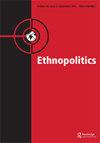The Fear of Ethnic Domination: Explaining the Persistence of Natural Resource Conflicts in Nigeria
IF 1.2
Q3 ETHNIC STUDIES
引用次数: 4
Abstract
ABSTRACT Peasant-pastoralist conflicts are prevalent in postcolonial Africa—especially in the Sahel. Typically confined to rural areas, these conflicts have taken on ethnic, religious, and regional dimensions, engendering food and human insecurity as well as paralysing economic development in weak African states with fragile democratic experiments. Whilst volumes explaining the causes and consequences of the conflicts through environmental security and political ecology theoretical frameworks are not uncommon, the reasons for the conflicts’ intractability are largely underexplored. This article draws on the ontological security theoretical framework and Nigerian experiences to contend that peasant-pastoralist conflicts’ persistence owes not so much to environmental security or political ecology but to ethnic fears and historically accumulated prejudices which portend ethnic groups as existential threats. With the case of the Rural Grazing Area (RUGA) policy which—despite its intention to ensure food security, enhance employment opportunities, and integrate the belligerent parties—was abruptly suspended, I contend that the policy failure was due in large measure to the ontological insecurity amongst ethnic groups that derives from the warring parties’ complex historical interactions. For ethnic groups in the Middle Belt and southern geopolitical zones comprehend pastoralists’ mobility as a hidden strategy to dominate the territories, and change the identities, of other ethno-religious groups. The consequence of these suspicions is the rejection of governmental policy initiatives geared toward resolving the conflicts. Ultimately, I argue that negotiations which break down inflexible attachments to demonising narratives and support mutual security-seeking amongst various groups are requisite for bridging ontological insecurities between pastoralists and peasants in Nigeria.对种族统治的恐惧:解释尼日利亚自然资源冲突的持续
摘要农牧民冲突在后殖民时代的非洲普遍存在,尤其是在萨赫勒地区。这些冲突通常局限于农村地区,具有种族、宗教和地区层面,造成了粮食和人类的不安全,并使脆弱的非洲国家的经济发展陷入瘫痪。虽然通过环境安全和政治生态学理论框架解释冲突的原因和后果的数量并不罕见,但冲突棘手的原因在很大程度上没有得到充分的探索。本文借鉴本体论安全理论框架和尼日利亚的经验,认为农牧民冲突的持续与其说是环境安全或政治生态,不如说是种族恐惧和历史积累的偏见,这些偏见预示着种族群体是生存威胁。农村放牧区(RUGA)政策虽然旨在确保粮食安全、增加就业机会和整合交战各方,但突然被暂停,我认为,政策的失败在很大程度上是由于交战各方复杂的历史互动导致的种族群体之间的本体不安全。对于中部地带和南部地缘政治区的族群来说,他们将牧民的流动理解为一种隐藏的策略,以控制其他种族宗教群体的领土并改变他们的身份。这些怀疑的结果是拒绝了旨在解决冲突的政府政策举措。最终,我认为,为了弥合尼日利亚牧民和农民之间的本体论不安全感,必须进行谈判,打破对妖魔化叙事的僵化依恋,支持不同群体之间寻求相互安全。
本文章由计算机程序翻译,如有差异,请以英文原文为准。
求助全文
约1分钟内获得全文
求助全文

 求助内容:
求助内容: 应助结果提醒方式:
应助结果提醒方式:


